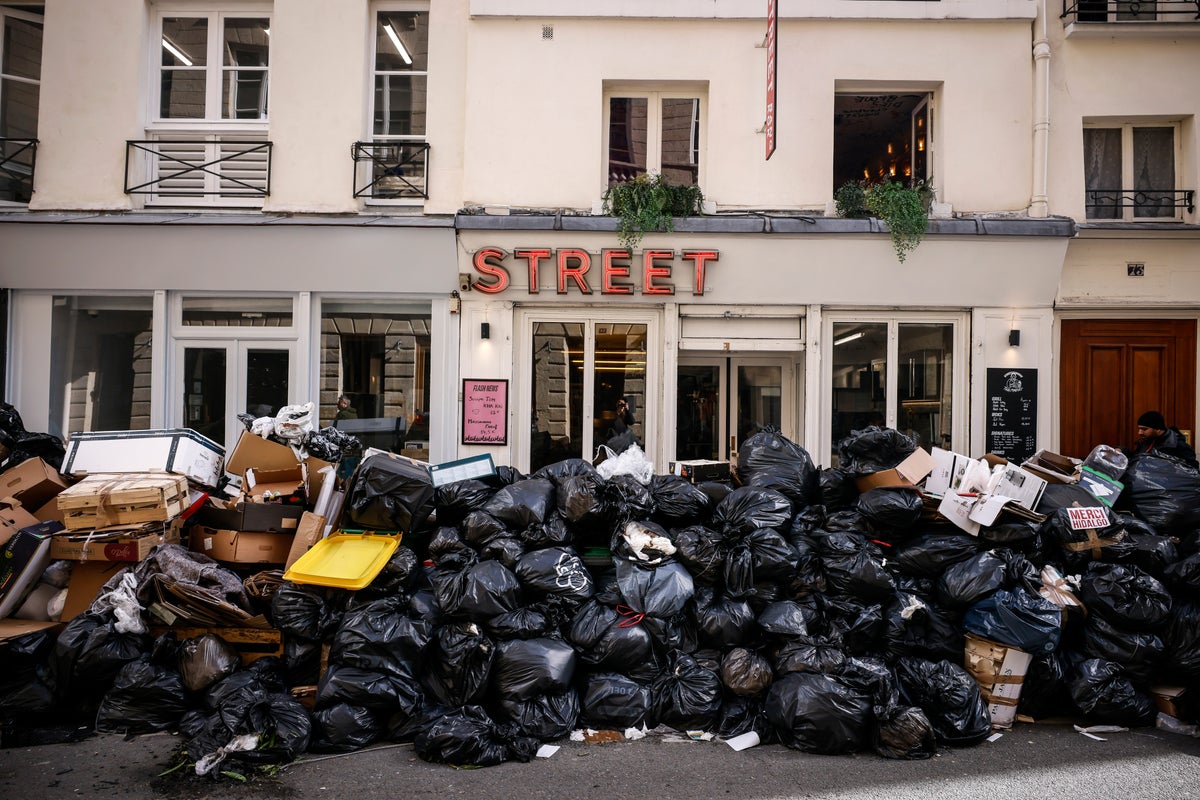
Garbage. Heaps, mounds and piles of it are growing daily — and in some places standing higher than a human being.
A strike by Paris garbage collectors, which begins its 16th day on Tuesday, is taking a toll on the renowned aesthetics of the French capital, a veritable blight on the City of Light.
“I prefer Chanel to the stink,” joked Vincent Salazar, a 62-year-old artistic consultant who lives in a tony Left Bank neighborhood. A pile of garbage sits at the corner of his building overlooking the Luxembourg Gardens.
“I’ve seen rats,” he said.
But like many nonchalant and strike-hardened Parisians, Salazar doesn’t mind.
“I’m fortunate to live here, but I’m 200% behind these guys,” Salazar said. “They're smelling it all day long,” he said, though “it” wasn't precisely the word he used. "They should get early retirement.”
He is among the majority of French who, polls show, oppose President Emmanuel Macron’s decision to raise the retirement age by two years, from 62 to 64 for most and from 57 to 59 for garbage collectors.
Macron rammed the showcase legislation of his second term through Parliament last week — without a vote, thanks to a special constitutional article. On Monday, the government won two no-confidence motions put forth by angry lawmakers. The bill is now considered adopted.
But garbage got wrapped up in the politics. And neither unions organizing protests nor some citizens are prepared to back down.
Posters showing a digitally altered image of Macron atop a garbage heap — or collecting garbage himself — have made the rounds on social networks.
The Socialist mayor of Paris, who supports the strikers, has found herself in a bind. City Hall refused orders to get the trucks out, saying it’s not their job. The police prefecture then ordered garages unblocked. Using private companies, garbage has been collected in “highly impacted” districts, City Hall said. There are problems dumping the garbage in blocked incinerator plants. Still, City Hall said that as of Monday, 9,300 tons of rubbish remained on the streets, down from 10,000 days ago.
Workers in numerous sectors, from transportation to energy, have been holding intermittent strikes since January. But it is the garbage in the French capital that has made garbage collectors, long taken for granted, visible — and their anger obvious.
The city's vibrant outdoor culture is feeling the effects. Some of Paris' fabled narrow streets — challenging to negotiate on regular days — are even more choked than usual, forcing people on foot to pass through garbage heaps single file. The scent of rancid, rotting garbage increasingly wafts through the air as spring arrives and the weather grows milder. Seats at some sidewalk cafes located near heaps of rubbish are empty.
A server for the past 26 years at Le Bistro du Dome, adjacent to the famed restaurant Le Dome, said some 50% of diners had disappeared in the past 10 days. Other restaurants are suffering the same fate, said Guillaume, who would identify himself only by his first name.
“It doesn't bother me because it's for a good cause,” said Franck Jacquot, 51, standing outside a small bar he runs. Nearby, heaps of garbage loomed. “If we're obliged to go this route — well, we're here," he said.
Two spontaneous protests last week at the huge Place de la Concorde, facing the National Assembly, degenerated when police started evacuating thousands with tear gas and water cannon. Some of those forced out began setting fires to garbage piles along their path through high-end Paris.
On Monday, hundreds of young people demonstrated near the gold-domed Invalides monument, site of Napoleon’s tomb, as security forces watched. A union van had blasted proceedings at the National Assembly on a loudspeaker. More is ahead: Unions are planning nationwide marches and strikes for Thursday to pressure the government to withdraw the retirement measure.
Garbage bags and bins have served as fuel for troublemakers, who combed Paris Monday night setting fires, as they've done after recent protests. At least 100 people were detained.
“Garbage is a good way to protest. It has a big impact,” said Tony Gibierge, 36, who is opening a restaurant in several months on a street in southern Paris — a street currently heaped with garbage.
He was among those who have peacefully demonstrated through Paris, and other cities, with song and dance in recent weeks. “Now we have to send out the fire, stop dancing,” he said. The message: Nothing is over, and much of the garbage isn't going anywhere quite yet.







